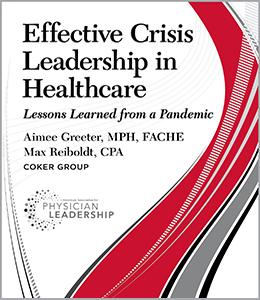Summary:
Preparation and adaptability are crucial in managing crises, whether they involve immediate safety threats or cultural and public unrest. Effective communication, strong leadership, and continuous training are essential for navigating these challenges successfully.
IMMEDIATE SAFETY
Crises involving immediate safety cannot be ignored in today’s world. We will not attempt to cover all the concerns and variables here, but these crises could be active shooters, natural disasters, fires, or inclement weather. While some of these may seem unlikely, it is still important to be prepared; we truly never know when the all-too-common angry patient could escalate to create a volatile situation.
The Occupational Safety and Health Administration (OSHA) requires a written Emergency Action Plan (EAP) “to facilitate and organize employer and employee actions during workplace emergencies.” OSHA has developed a checklist available at www.osha.gov/SLTC/etools/evacuation/eap.html to address general issues, evacuation policy and procedures, reporting emergencies and alerting employees, and employee training and drills.
The challenge operationally is to keep this information fresh and ensure continuity through personnel turnover and potential changes. Incorporate this into annual training programs and communicate consistently, leveraging current events to prompt conversation and reminders for your organization.
CULTURAL AND PUBLIC UNREST
Cultural movements and developments have had a significant impact on business operations throughout history and particularly in recent years. More recently, businesses have been forced to adjust operations or close entirely because of COVID-19 repercussions, Black Lives Matter protests, political strife, and other demonstrations of civil unrest.
Preparing in advance is a challenge because these crises often develop quickly and without warning. They also manifest differently in specific markets or regions, making it challenging to balance the appropriate level of response or forecast direct implications for your operation. Communication is most critical both internally and externally with customers, patients, and key stakeholders. We have all experienced under and over communication from businesses during these scenarios; balance is the key.
Communicate Responsibly. Identify key audiences and group them by level of detail or frequency of communication. Employees may require more frequent and detailed communication than patients or customers.
Rely on Leadership. Trust talented leaders to make good decisions. If you do not have strong leadership, then proactively address that as a separate issue. Crisis scenarios often highlight weak leadership, but that is not when you want to be made aware.
Be Willing to Change Direction. These situations evolve rapidly, and it may not make sense to hold on to your first position or response forever.
Stay Informed and Objective. As a leader, put the organization first and captain the ship through the storm. Trust your intuition, but listen to your employees, patients, and partners. Like any good captain, rely on and leverage the talent around you to achieve the best outcomes.
Leaders often feel pressure to have the answers and respond quickly to comfort or assuage concern, which is often impossible and/or not the most effective approach. Be willing to take a breath and communicate that you are still gathering information. You can be responsive and communicate effectively without providing answers or a definitive plan. Your response to cultural and public crises will likely require collective wisdom and leadership to manage effectively.
Excerpted from Effective Crisis Leadership in Healthcare: Lessons Learned from a Pandemic by Aimee Greeter, MPH, FACHE, and Max Reiboldt, CPA.
Topics
Environmental Influences
Action Orientation
Collaborative Function
Related
How to Make a Seemingly Impossible Leadership DecisionRedefining Physician Leadership: A Comparative Review of Traditional and Emerging Competencies and DomainsHow to Stand Out to C-Suite RecruitersRecommended Reading
Problem Solving
How to Make a Seemingly Impossible Leadership Decision
Problem Solving
Redefining Physician Leadership: A Comparative Review of Traditional and Emerging Competencies and Domains
Strategy and Innovation
How to Stand Out to C-Suite Recruiters
Strategy and Innovation
Lessons Learned from the Restaurant Industry: What Outstanding Waiters and Waitresses Can Teach the Medical Profession
Team Building and Teamwork
Applying Cross-Functional Team Methodology in Healthcare: Critical Considerations from Lived Experience
Team Building and Teamwork
Human Resources: Motivation and Employee Retention



